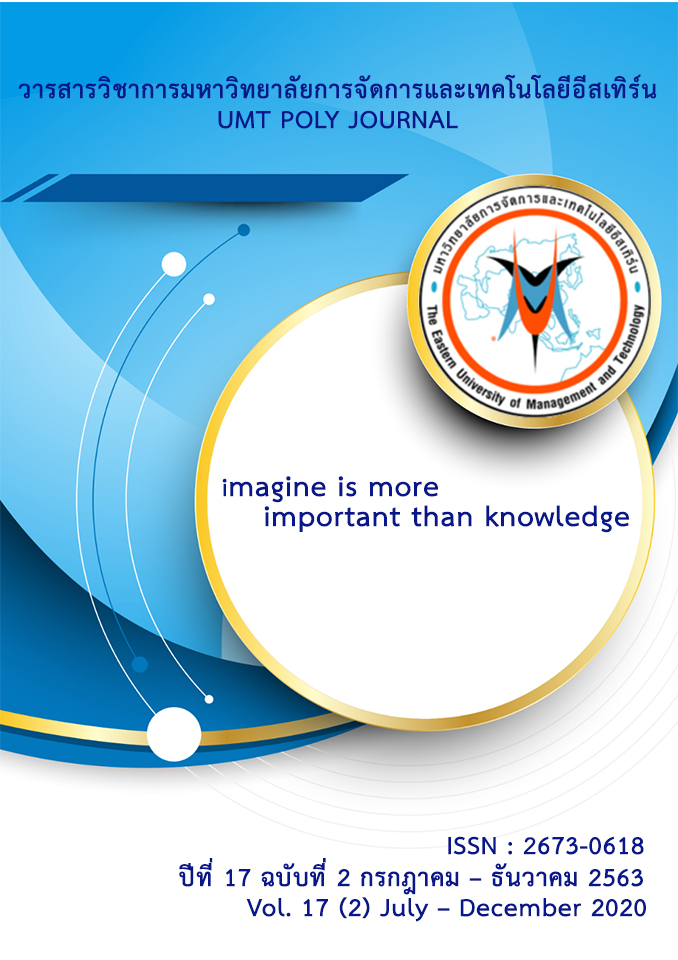A study on the effect of international situation factors on the cooperation performance of transnational alliance of private universities in china
คำสำคัญ:
Transnational strategic alliance of Chinese, Private Colleges and Universities, Internet International situation, Alliance Performanceบทคัดย่อ
Many private universities in China are short of resources and lack of core competitiveness. For the sustainable development of Chinese private colleges and universities, an increasing number of Chinese private colleges and universities have established transnational alliances through international exchanges and cooperation to realize the rapid growth of Chinese private colleges and universities. However, in the process of transnational alliance cooperation, the performance of transnational alliance cooperation of Chinese private universities is not ideal due to the influence of transnational situational factors and the risks faced by the alliance cooperation in the transnational context. Therefore, this study intends to explore the effect of transnational situational factors and risks of alliance cooperation in Chinese private universities on alliance cooperation performance.
In this paper, based on strategic alliance theory and system theory, by choosing the Chinese private universities who has already set up the transnational alliance as samples and establishing the model and assumptions to analyze the influence of situational factors and risks on the cooperation performance of multinational alliances of Chinese private universities under the transnational context. The empirical results show that: first, the situational factors of multinational alliance cooperation in Chinese private universities are strongly correlated with alliance performance, and the differences between Chinese and foreign cultures are negatively correlated with alliance performance. System is negatively correlated with alliance performance; International experience is positively correlated with alliance performance. Second, in the process of testing the regulating variables, the opportunistic behavior of Chinese private universities in transnational alliance cooperation will make the operation of transnational alliance cooperation unstable, thus reducing the performance of alliance cooperation.
Downloads
เอกสารอ้างอิง
Cai, S. (2010). The organization of regional clusters. Academy of Management Review, 34(4): 623-642.
Cheng, J. F. (2013). Alliance Research: Less Is More. Journal of Management Studies, Vol. 43, pp. 1621-1628.
Dyer, F. and Singh, O. (1998). Output sector munificence effects on the internal political economy of marketing channels. Journal of Marketing Research, 24 (4):347-358.
Gill, J. And R. J. Butle. (2003). Managing Instability in Cross-Cultural Alliances. Long Range Planning, Vol. 36, pp.543 -563.
Gilsing, B. and Nooteboom, G. (2005).The Small World of Strategic Technology Alliances. Technovation, Vol.24, pp.563~571.
Gulati, R., Gargiulo, M. (2000). Where do interorganizational networks come from.American Joumal of Sociology, 104(5):1439-1493.
Gulati, R. (1998). Aliances and networks. Strategic Management Journal, 19(4):293-317.
Hu, L. (2016). Research on the way to improve the quality of Sino-foreign Cooperation in higher Vocational Colleges. Science, Technology and Economics, 3153-154. [In Chinese]
Jiang, G.G. (2009) Clusters, networks, and firm innovativeness. Strategic Management Journal, 26(3):287-295.
Michacl. E. Porter (1985) The leveraging of interfirm relationships as a distinctive organizational capability: a longitudinal study. Strategic Management Journal. 20(4):317-338.
Ouchi, W. (2004). Strategies for Managing A Portfolio Of Alliances. Strategic Management Journal,Vol. 28,pp. 827-856.
Spree Kvcersk. (2002). Collaboration and Innovation: A Review of the Effects of Mergers,Acquisitions and Alliances on Innovation. Technovation, Vol.25, pp.1377~1387.
Rabin Middle Hurst. (2001). Uncertainty, Opportunism and Governance: The Effects of Volatility and Ambiguity on Formal and Relational Contracting. Academy of Management Journal, Vol.49, pp.1058~1077.
Sun, M. (2015). Exploring the outlet of Sino-foreign Cooperation in running higher Vocational Colleges-taking the Eine Branch of Zhong Shan Vocational and Technical College as an example. Journal of Heilongjiang Institute of Education, Vol.20, pp.12-22. [In Chinese]
Tiwana A. (2008) Do bridging ties complement strong ties? An empirical examination of alliance ambidexterity. Strategic Management Journal, 29(3):251-272.
Uzzi, B. (1997). Social structual and competition in interfirm network: the paradox of embeddedness. Administrative Science Quarterly, 42(1):35-67.
Wu, J. (2007). Discussion on the Construction of Management Mechanism of Sino-foreign Cooperation in higher Vocational Colleges. Shanxi Youth, Vol.15, pp.10-25. [In Chinese]
Wu, Q. (2004). This paper analyzes the research on the mode of five-year higher vocational education with Chinese-foreign cooperation. Journal of Jiamusi Vocational College, Vol.12, pp.2-8. [In Chinese]
Yang, K. M. (2004). Origin of Alliance Portfolios: Entrepreneurs, Network Strategies, and Firm Performance. Academy of Management Journal, Vol. 52, pp. 246-279.
Zhan, J. (2008).A preliminary study on the Mode of Sino-foreign Cooperation in higher Vocational Colleges: taking Tangshan Polytechnic College as an example. Industrial Technology and Vocational Education, 2: 60-61. [In Chinese]
Zhao, R. C. (2001). R&D Alliances and Firm Performance: The Impact of Technological Diversity and Alliance Organization on Innovation. Academy of Management Journal, Vol.50, pp.364~386.
Zoollo, M. And Meyer, H. (2004). On the Dialectics of Strategic Alliances. Organization Science, Vol. 15, pp. 56-69.
Zhou,Y. (2005). The present situation, problems and countermeasures of Sino-foreign cooperative projects in vocational colleges and universities: a case study of Wuxi Vocational and Technical College. Journal of Lianyungang Vocational and Technical College, Vol.15, pp.55-57. [In Chinese]
ดาวน์โหลด
เผยแพร่แล้ว
ฉบับ
ประเภทบทความ
สัญญาอนุญาต
ประกาศลิขสิทธิ์
เนื้อหาและข้อมูลในบทความที่ลงตีพิมพ์ในวารสารวิชาการมหาวิทยาลัยการจัดการและเทคโนโลยีอีสเทิร์น ถือเป็นข้อคิดเห็นและความรับผิดชอบของผู้เขียนบทความโดยตรง ซึ่งกองบรรณาธิการวารสารไม่จำเป็นต้องเห็นด้วยหรือร่วมรับผิดชอบใด ๆ
บทความ ข้อมูล เนื้อหาหรือรูปภาพ ฯลฯ ที่ได้รับการตีพิมพ์ในวารสารวิชาการมหาวิทยาลัยการจัดการและเทคโนโลยีอีสเทิร์น ถือเป็นลิขสิทธิ์ของวารสารวิชาการมหาวิทยาลัยการจัดการและเทคโนโลยีอีสเทิร์น หากบุคคลหรือหน่วยงานใดต้องการนำข้อมูลทั้งหมดหรือบางส่วนไปเผยแพร่ต่อหรือเพื่อกระทำการใด ๆ จะต้องได้รับอนุญาตเป็นลายลักษณ์อักษรจากวารสารวิชาการมหาวิทยาลัยการจัดการและเทคโนโลยีอีสเทิร์นก่อนเท่านั้น




